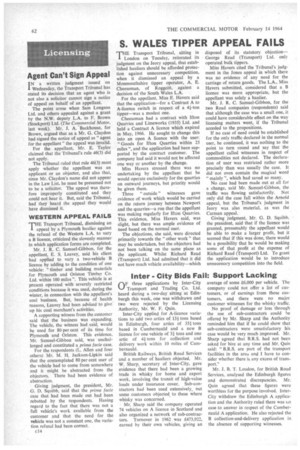Agent Can't Sign Appeal
Page 64

If you've noticed an error in this article please click here to report it so we can fix it.
IN a written judgment issued on I Wednesday, the Transport Tribunal has stated its decision that an agent who is not also a solicitor cannot sign a notice of appeal on behalf of an appellant.
The point arose when Sam Longson Ltd. and others appealed against a grant by the N.W. deputy L.A. to F. Brown (Stockport) Ltd. (The Commercial Motor, last week). Mr. J. A. Backhouse, for Brown, argued that as a Mr. G. Claydon had signed the notice of appeal as "agent for the appellant" the appeal was invalid.
For the appellant, Mr. E. Taylor claimed that the Tribunal's rule 46(3) did not apply.
The Tribunal ruled that rule 46(3) must apply whether the appellant was an applicant or an objector, and also that, since Mr. Claydon's name did not appear in the Law List, he must be presumed not to be a solicitor. The appeal was therefore improperly constituted and they could not hear it. But, said the Tribunal, had they heard the appeal they would have dismissed it.
WESTERN APPEAL FAILS
E Transport Tribunal, dismissing an 'T'HE
by a Plymouth haulier against the refusal of the Western L.A. to vary a B licence, criticized the slovenly manner in which application forms are completed.
Mr. J. R. C. Samuel-Gibbon, for the appellant, E. S. Leavey, said his client had applied to vary a two-vehicle B licence by adding to the condition of one vehicle: "timber and building materials for Plymouth and Oriston Timber Co. Ltd. within 100 miles ". This vehicle is at present operated with severely restricted conditions because it was used, during the winter, in connection with the appellant's coal business. But, because of health reasons, Leavey had been advised to give up his coal merchant's activities.
A supporting witness from the customer said that the business was expanding. The vehicle, the witness had said, would be used for 80 per cent of its time for Plymouth and Oriston. This evidence, Mr. Samuel-Gibbon said, was unchallenged and constituted a prima facie case.
For the respondents (L. Allen and four others) Mr. M. H. Jackson-Lipkin said that the contemplated 80 per cent user of the vehicle had to come from somewhere and it might be abstracted from the objectors. There had been evidence of abstraction.
Giving judgment, the president, Mr. G. D. Squibb, said that the prima facie case that had been made out had been rebutted by the respondents. Having regard to the fact that there was not a full vehicle's work available from the customer and that the need for the vehicle was not a constant one, the variation refusal had been correct.
c14
















































































































































































